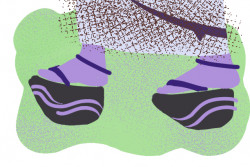
April 30, 2024
Fresh Ink: Two Shorts By Osamu Dazai
The English-language debut of “The Ocean” and “Sweltering Heat Tale”
All of the articles in our Fresh Ink series highlight the English-language debuts of never-before-translated works of prominent Japanese writers.
Osamu Dazai is one of Japan’s literary legends: a tormented and embittered man who drowned himself in the Tamagawa Canal, but who lived on to inspire generations with his earthy, all-too-honest style and gut-wrenching plots. He wrote a number of tiny, fragmentary stories in newspapers and magazines over the course of his life, which have been extensively cataloged and uploaded in the public domain at Aozora Bunko.
“The Ocean” and “Sweltering Heat Tale” are both works that point at the deeply buried trauma of their respective narrators. The male protagonist of “The Ocean” is obsessed with the notion of showing his young daughter the sea in the midst of World War II, and the female protagonist of “Sweltering Heat Tale” waxes poetic over artistic talent—barely concealing bitter regret at her own lack thereof. Dazai’s fantastic artistic flourish of weaving together human emotion, big ideas, and resonant imagery is on full display in these fractured tales.
The Ocean
Osamu Dazai
translated by Eric Margolis
I lived in Mitaka, Tokyo when the bombs rained down over our neighborhood day after day, and the only bitter thought that I had was not that I might die—but rather that if a bomb were to fall on our heads, the child would die without ever having seen the ocean. I was born in the plains of Tsugaru, far to the north, so I didn’t see the ocean until relatively late. I was ten years old. The burst of excitement I felt the moment I saw it has become one of my most precious memories. I want to show her the ocean too, at least one time.
She’s five years old now. Eventually, the bombs destroyed the house in Mitaka, but we all managed to escape injury. My family and I went to my wife’s hometown, Kofu. But the enemy planes targeted Kofu as well before long, and we lost the only house we had to go to. The war raged on. It became clear that the only choice left to us was to bring her to the land where I was born. That would become our tomb.
We set out from Kofu for Tsugaru. We traveled for three days and nights before we finally arrived at a quiet station in Akita. We transferred to an even quieter train, and breathed little sighs of relief.
I hurried to the conductor. “The ocean—which side can we see it from?” This railroad hugs along the coastline. The conductor told us and we sat on the correct side of the car.
“The ocean is coming! Any minute now. It’s the sea from all those fairy tales.” I couldn’t stop myself from talking. “Look! The ocean! That’s it, that’s the ocean! Ah, there it is! It’s so big, right? Look, you can see it, right there.”
At long last, I showed it to my little girl. I showed her the ocean.
“It’s a river,” she said calmly. “Mommy, a river.”
“A river?” A wave of shock struck me.
“Yes, a river,” my wife mumbled, half-asleep.
“No, it’s not a river. It’s the ocean. Look how different it is from a river! So cruel, calling the ocean a river!”
This memory was one to be forgotten. I stared at the ocean at twilight, alone.
Sweltering Heat Tale
Osamu Dazai
translated by Eric Margolis
It’s hot, isn’t it? This year is especially hot. It’s truly hot. And I just feel so awful that you took the trouble to come all the way out to this little village in this terrible heat, but anyway, that’s all I have to say. Please, take off your coat. Come on. It must be miserable walking around outside today. Using a parasol could make things a bit more comfortable, but I suppose you don’t see many men walking around with parasols out.
But we mustn’t have nothing to talk about. Maybe art? No, that won’t do. I used to absolutely adore art, and I had all these artist friends, and I’d put on a fancy face and disparage their paintings, yes, I remember those days. But last fall, I decided to try my hand at a few paintings myself, and even I couldn’t believe how bad they were, so ever since then I haven’t breathed a single word about art in conversation. I also take special care to shower praise on anything my friends make.
This doesn’t have to do with art at all: just yesterday, I saw bunraku at the Shinbashi Theater. I had only ever seen those dramatic puppets and heard the haunting chants one time in my student days, so it had been nearly ten years. I went with high expectations that the masters would astound me all the more with their craft having grown and matured, but to my eyes, the performance hadn’t changed in the slightest. It was exactly as I saw it ten years ago, exactly. So it didn’t meet my expectations, yes. But thinking things over a bit more, I started to realize that the fact that things hadn’t changed was an even more astonishing astonishment, all the more worthy of my appreciation. It sounds bad that the performance didn’t progress, but on the other hand, it didn’t regress. A lack of regression is no small matter.
Training isn’t a way to become a master. It’s just a necessary means to hold on to your natural talents. It takes a lot of effort to not regress. Hats off to the artists who maintain their level of craft without a single step back. Most people regress with age. Saying that artistry naturally gets better with age is a big fat lie. Without an excessive amount of training, even the greatest geniuses will stumble. And the first stumble can often be the last.
Staying the same isn’t some run-of-the-mill matter. To be honest, progressing or taking a major leap is so terrifying that most artists can scarcely conceive of it—only divine providence can offer that opportunity. Even the slightest, paper-thin progress—but why? Why? All of my unceasing schemes to move forward, from a distance, look like no more than staying in place. Talentless rubberneckers will wonder, how could that artist not have come up with something better, it’s been ten damn years. But that’s just impertinent—how brash of them to fail to realize just how much training and practice it requires to maintain something for ten years. One should experience the hardships of art themselves before they set about criticizing others with any sort of authority.
And it’s just so terribly hot. I wonder what it’d be like to try on a padded kimono in this scorching heat. Perhaps it’d be cool for a change. It’s just so hot anyway.







